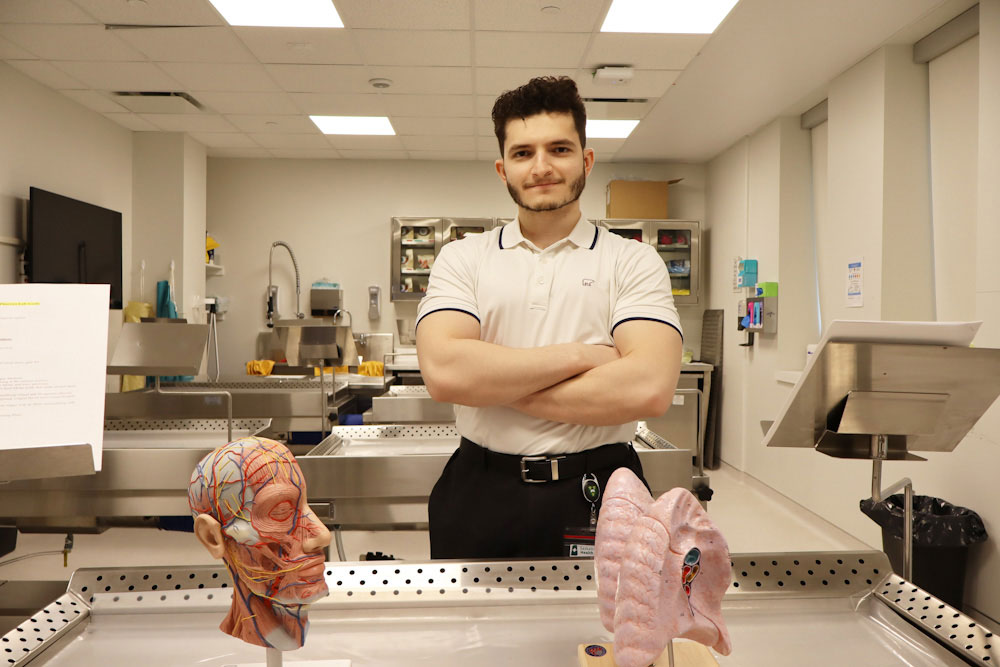
Supporting our students
Completing a degree in medicine is a major achievement and a huge responsibility. It requires a significant investment of time, money, and dedication. Support in the form of scholarships, bursaries and awards can be critical in ensuring students have the resources they need to achieve their educational goals.
By Trenna BruskyAbd Alfatah Alras (BScKin'23) grew up watching his father, an orthopedic surgeon, change lives. From grade one he knew he wanted to be a doctor, too.
Abd was born and raised in Syria. His family left Syria because of the war, lived as refugees for a period, and has called Saskatchewan home for the past seven years.
“Saskatchewan is now the place where I have stayed the longest... So, to me, it’s like my home now and I’m very fortunate to have a lot of opportunities and a lot of blessings from this land,” he reflected.
Before entering USask’s College of Medicine, Abd completed an undergraduate degree in kinesiology—receiving the Dean’s Medal as the graduating student with the highest grade-point average. Now a second-year medical student at USask’s Regina campus, he is navigating living away from his family while pursuing his passion.
Although the transition to living in Regina was challenging, Abd believes being selected as a student for the Regina campus was a blessing and a privilege. The smaller, more intimate classes have helped him with both the educational and the social aspects of school. “I really enjoy my time in the classroom. As they say, I’m really enjoying the journey. I think when I finish medical school, when I reflect on it, it will be one of the best times in my life,” said Abd.
Medical students often have to balance the cost of tuition and living expenses on top of the demands of a rigorous program. Bursaries, scholarships and awards provide important financial relief that allows students to focus on their studies and dedicate more time to valuable extracurricular activities like clubs, internships, and research projects. The College of Medicine currently offers over $300,000 in bursaries and scholarships, which are made available by generous contributions from alumni and donors.
Abd, who juggles his studies, family commitments, community involvement, volunteerism and work, explained it like this: “When you get a bursary, it is equivalent to the income of one to two full-time jobs. How I love to think about it is that every $20 I receive from a scholarship is just one hour of my time that is being freed.”
He has been able to spend his extra time studying and to continue helping to build a strong, supportive academic community with those around him.
While completing his undergraduate degree, Abd co-founded and was the director of the award-winning USask Amal Humanitarian Club, which serves the community while providing volunteer and leadership opportunities for students.
As a medical student, he and some of his Regina campus classmates started the Good Doctor Club. Members gather to review past course material to keep knowledge fresh and improve their retention. Abd stressed that he is only able to be part of this valuable extracurricular group because of the time freed up for him because of his bursary.
Abd also explained that medical school is often the last stage when students will experience financial strain—that it can be stressful worrying about school and financing especially with the pressures of a busy schedule. He said donor support, “is a great investment that makes a huge positive change to a student... Being on the receiving end of it, I can tell you for sure I will be a donor as well once I start having an income, I believe that it’s definitely worth it. It’s a good investment.”
What is Abd most looking forward to about becoming a doctor? He thoughtfully explained, “patients come to you in a very vulnerable state, and with their families concerned for them. You are the one who can help them; you’re the one who is there to support them when they are most vulnerable... That’s why I study hard, because I want to make sure that I can help my patients the best way I can.”
Article originally published at https://medicine.usask.ca


